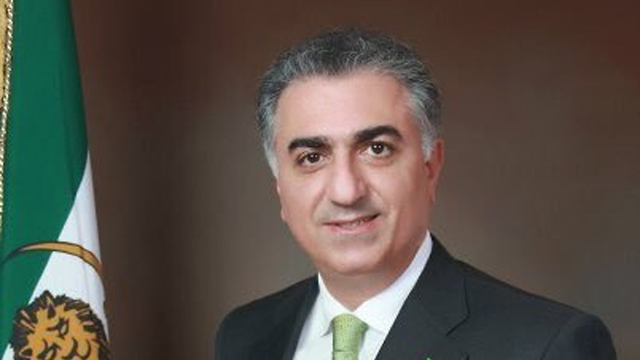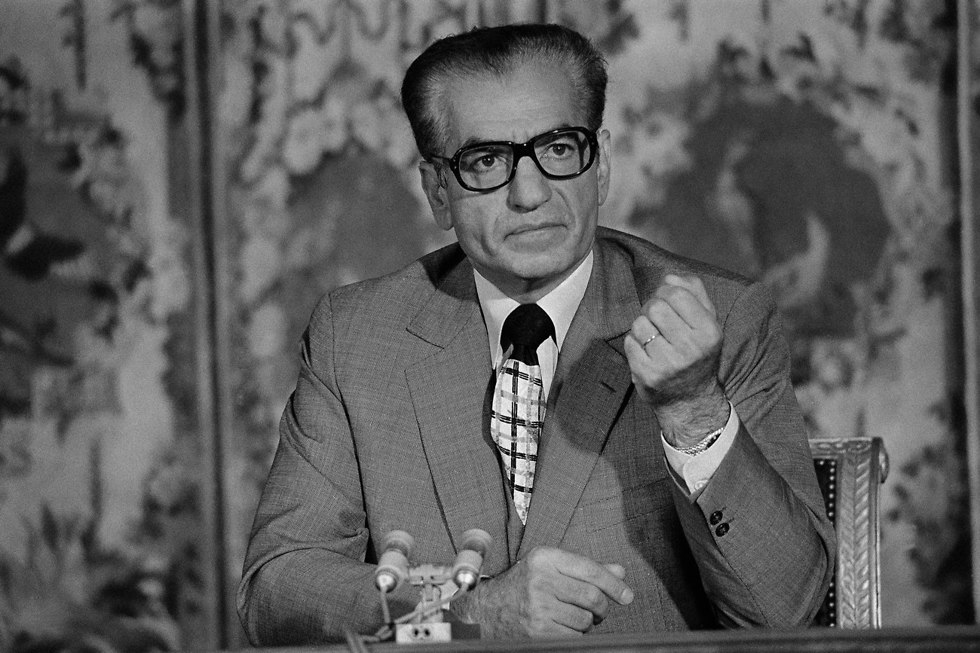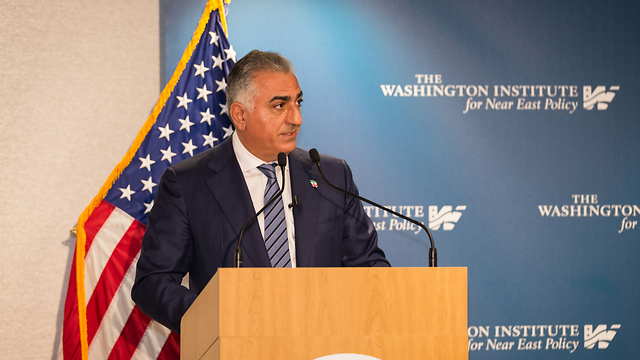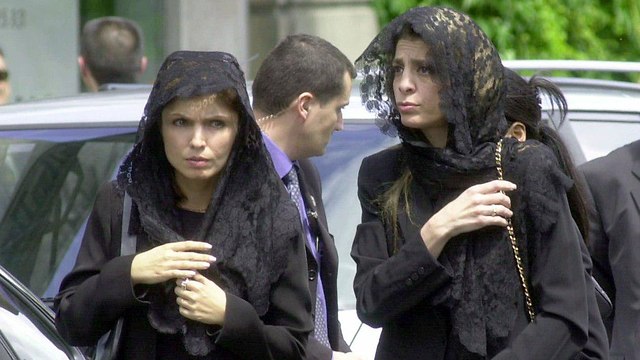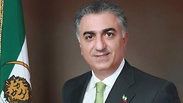
NEW YORK — Exactly 40 years ago, the Islamic Revolution brought about the collapse of the Iranian monarchy and its regime in Tehran and the rise of the ayatollahs. In a rare interview to Israeli media, Reza Pahlavi, crown prince and son of the deposed Shah, tells Ynet that he envisions a time in which Tehran and Jerusalem are once again allies.
"In the future democratic Iran, we expect relations with Israel to be friendly once again," says Pahlavi, who is currently in the US working against the ayatollahs' regime. "In principle, we will hold relations with all friendly countries, on a basis of mutual respect."
Reza Pahlavi's father, Shah Mohammad Reza Pahlavi, fled Iran on January 16, 1979, in the shadow of bloody demonstrations in Tehran and other cities. The masses took to the streets to protest against his corrupt regime, which was brutally suppressing its opponents. After months of clashes, with the army showing signs of vulnerability and the cancer-stricken Shah seemed incapable of ruling, Mohammad Reza Pahlavi fled to Egypt - and the ayatollahs came to power led by their spiritual leader Ruhollah Khomeini.
The Shah's son, Reza Pahlavi, was in the United States at the time. He had been sent to America for study two years earlier, at the age of 17, and he has remained there until today. In 1980, when he was 21 years old, his father died in exile in Egypt, and Reza Pahlavi assumed the mantle of head of the royal family. Since then, he has dedicated his life to opposing the religious regime in Tehran.
While many Iranians remember the Pahlavi family as a symbol of tyranny, corruption and profiteering at the expense of the ordinary people, Prince Reza Pahlavi believes that the general public still admires the dynasty that he now heads. Over the past year, there have indeed been reports of public expressions of affection and longing for the Shah and his secular regime, given the economic and social problems in Iran, but for the time being these expressions do not seem to be too widespread.
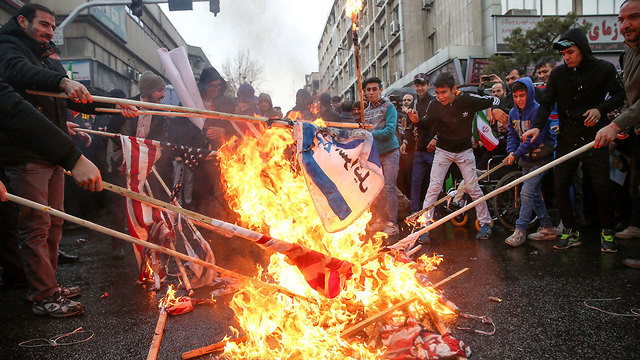
"The citizens of Iran have woken up to false truths and lies that the current regime has tried to feed them through brainwashing," the crown prince says. "This has triggered a counter-reaction, and today the young people are determined to expose the truth about the past, and all we have to do is track the social networks: the cries of support from people, the slogans they write, the calls backing my grandfather at soccer stadiums. Anyone who wants to look and listen can see the writing on the wall."
It is vital to remember that although Iranians now live under a religious dictatorial regime, Shah's Iran was also a dictatorship, even if there were those who called it an "enlightened dictatorship." Shah Mohammed Reza Pahlavi admired the West, worshiped French culture, and viewed secularism as the only way to modernize and advance. But he was also the man who, in the name of these principles, threw thousands of political prisoners in jail and sent the secret police to punish his opponents. And while millions of his compatriots were living in poverty, he had fleets of airplanes and luxury cars, and splurged on works of art and gold jewelry.
Non-violent revolution
Crown Prince Reza Pahlavi believes that there is still room for an Iranian monarchy today. "Iran was modern during the monarchy," he says. "Is Japan not modern? Are Sweden, Britain or Spain not modern? The current regime is the one that is archaic, and in any event, the shape of the future government is something the Iranian people will have to decide for themselves; I am not working towards any particular outcome."
From his seat in the US, the heir to the Iranian throne focuses his activities on opposing the ayatollahs' regime, even if merely on the declarative level. He is active in organizations for the exiled opposition, and in his official biography he presents himself as "a leader and ambassador of the principles of freedom, democracy and human rights" for his people. He says he will continue to battle the regime of the ayatollahs while "standing against the exploitation and oppression of the Iranian people and for the establishment of a secular democracy in Iran."
Reza Pahlavi tells Ynet that the ayatollahs' regime poses the greatest threat to the people of Iran - more so than any external political or military threat. "The current regime in Iran is the state's central problem, one that will certainly lead to the destruction of our country. It is a system designed to preserve the survival of the regime, not its citizens."
Your father's rule was overthrown in the Khomeini revolution. What is your strategy for overthrowing the ayatollahs?
"The Shah was not defeated by a wild mob or the violent revolution — he chose to leave the country of his own accord to avoid bloodshed.
:Unlike my father, this regime will not leave voluntarily because its people don't care if they spill the public's blood. But that does not mean that our path to changing the regime has to be violent. I believe in civil disobedience that strives for change but also limits the sacrifices that citizens are forced to make."
The last of his name
Reza Pahlavi is the only member of his immediate family who is still engaged in political activity to promote a free Iran and to preserve the heritage of the family's dynasty. After the revolution, his mother Farah, his brother Prince Ali-Reza and his sisters Princess Farahnaz and Princess Leila fled to the United States. But while he established himself as head of the opposition in exile, his siblings struggled to find their own places.
His younger sister Leila tried her luck as a model, but suffered from anorexia and in June 2001, at the age of 31, she took her own life in a London hotel. The cause of death was an overdose of cocaine and sleeping pills.
Ten years later, his brother Ali-Reza, the second in line to the throne, also committed suicide. He seemed to be a successful man, who had studied at Princeton, Columbia, and Harvard, but his father's humiliating death, the life in exile, and especially the his beloved little sister Leila, took a massive toll. He became depressed, and at the age of 44 shot himself at his Boston home.
His last surviving sister, Farahnaz, studied social work, but according to The Los Angeles Times, struggled to find work with humanitarian organizations, apparently because of her family name. Today she lives out of the limelight.
Today, Reza Pahlavi involves his Yasmin and their daughters Noor, Iman and Farah in his public work.
"I've been doing this for 40 years, and the first thing I tell anyone is that the Iranian people are not represented by this regime," he says.
"If you look at the achievements of Iranian citizens who were forced to flee the country, you can see that these are extraordinary achievements. Iranian businessmen head some of the world's largest companies; Iranians are winning prizes for achievements in mathematics and scientific research. They are developing medicines to cure terrible diseases and winning praise at arts festivals all over the world.
"In a free Iran, citizens will be able to contribute to the development of their country instead of being forced in to exile abroad."















